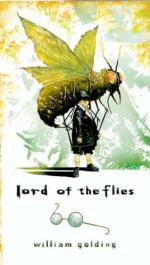|
This section contains 692 words (approx. 3 pages at 300 words per page) |

|
Inherent Evil in "Lord of the Flies"
Summary: In William Golding's classic novel, the boys on the island instinctively turn to evil acts in the absence of civilization. Without a stabilizing society, humans selfishly act in their own interests because there is no punishment for bad behavior.
According to The New International Webster's Student Dictionary, "evil" is defined as "morally bad," or, "something that harms or hurts." This idea of evil is the main theme in William Golding's novel, Lord of the Flies. In the novel, a brutal war is taking place, and in an attempted escape, a group of British boys are stranded on a deserted island . While they inhabit the island, the boys find themselves turning their backs on civilization, and embracing their human instincts of evil. By realistically portraying children in the given situation, Golding proves his theme that humans are inherently evil.
Given the choice, children would rather play and have fun than do hard work. In the novel, the boys show enmity towards building shelters. Even though the work is important in order to be rescued, the boys are still off, "bathing, or eating, or playing"(Golding 45). To the boys...
|
This section contains 692 words (approx. 3 pages at 300 words per page) |

|


